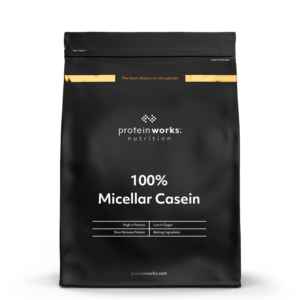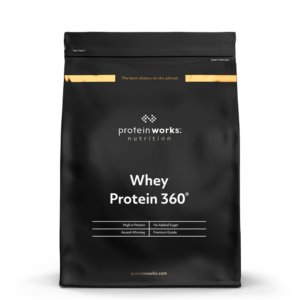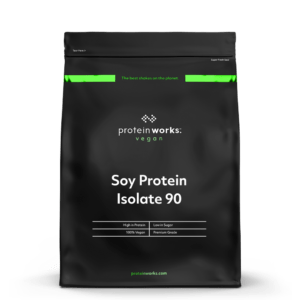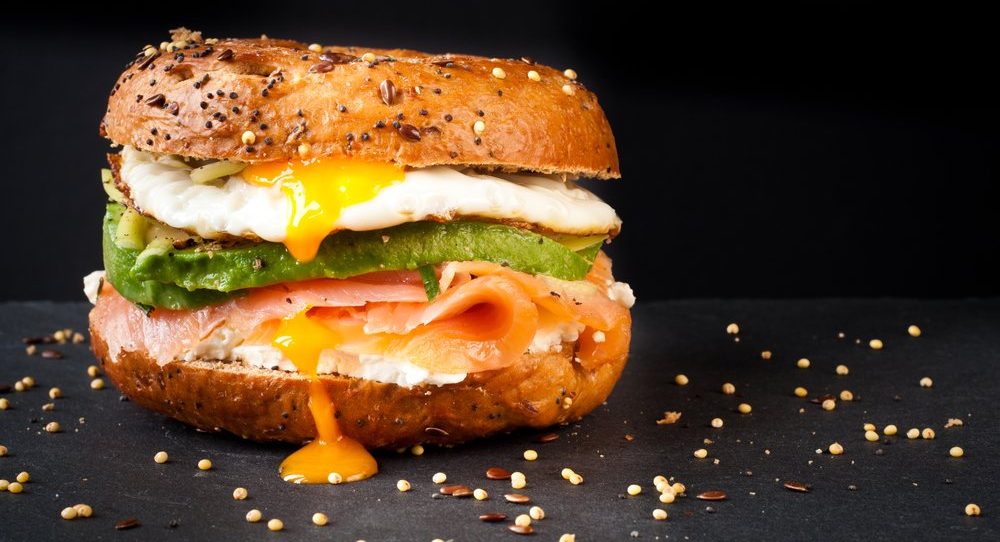Protein shakes are undoubtedly one of the most popular health supplements on the market; in fact, they are a daily staple in the diets of many active adults, athletes and bodybuilders. Many people use protein shakes to supplement their diet to help towards a goal of building muscle, losing weight or improving health overall. Protein shakes, smoothies and breakfast foods enriched with added protein powder (such as protein porridge or protein pancakes) are now increasingly popular among those looking to kick start the day fuelled with a boost of protein. However, it’s the post-workout window of time where most people consume their protein shakes, to provide muscles with the nutrients they need in order to repair and grow.
So, what about consuming your protein shake before bed?
While not often considered the most optimal time to drink a protein shake; there is in fact research to show many benefits to consuming protein before sleep, and highlight how using pre-sleep protein as a nutritional strategy may enhance muscle growth and weight loss.
Many people avoid eating too close to bedtime with the belief that it can affect sleep/weight. However, research has shown that pre-sleep protein can in fact be sufficiently digested and absorbed because your gut is still able to function normally throughout the night as you sleep (5).
If you are going to include protein shakes in your diet, then it makes sense to drink them during a window of time that provides you with the greatest potential benefits. Post-workout protein consumption has long been regarded as the most effective method to refuel and optimise muscle growth. However, there is current research to suggest that drinking a protein shake before bed may actually provide additional health benefits!
Here, we delve into the evidence surrounding the effects of protein shakes before bed and provide some practical guidelines and tips for success:
Muscle Growth and Athletic Performance
If muscle growth is your goal, night time nutrition could be your go-to for gains while you sleep! Several studies have shown a positive benefit to consuming protein before bed, particularly for increased Muscle Protein Synthesis (MPS) and to help prevent muscle breakdown. Muscle protein synthesis (MPS) is the biochemical process our muscles use to grow, recover from exercise and get stronger. MPS is essential for recovery post-exercise and gaining muscle mass, read more in our MPS article which explains the process of MPS and how it is affected by protein intake.
Many people choose to train in the evening, often followed by post-workout protein shake. While it’s important to refuel your muscles after exercise to stimulate MPS and growth, training requires even more protein in your diet to compensate for the energy burned, so having an additional shake (or quality protein source) before bed can offer significant benefits. Particularly as when you sleep, muscle growth stimulation can be low and may increase the risk of muscle protein breakdown (MPB) throughout the night (1, 15).
In order to gain muscle and avoid muscle breakdown, it is important to maintain a positive muscle balance. Amino acids, commonly referred to as ‘the building blocks of protein’, are essential to maintain this positive balance, as when your body is lacking amino acids (either from lack of nutritious food or from oxidative stress as a result of exercise) it creates a negative muscle balance.
However, bringing your body back to a positive muscle balance is easily restored by consuming a protein shake. This balance is necessary for optimal muscle growth and to reduce muscle breakdown. Our bodies are in a constant cycle of amino acid depletion so it is important to ensure you are sufficiently nourished with protein throughout the day (and night!) to maintain the optimal environment for building muscle tissue.
For example, if an athlete or bodybuilder doesn’t meet their daily calorie/protein requirements, or burns more energy than they have consumed that day, muscle repair and growth will not occur and the body has to break down muscle tissue as fuel. This is known as a ‘catabolic state’, and studies have shown that this can be avoided by consuming additional protein or carbohydrates (4). This is where pre-sleep protein shakes can be incredibly useful to provide a convenient, easily digestible source of quality fuel to hit your energy requirements, while optimising your muscle building potential as you sleep.
Athletic Performance
Consuming a pre-sleep protein shake may also improve your athletic performance. Several studies have shown that protein before bed not only promotes muscle growth, but also further enhances strength and power. Research has highlighted an improved skeletal muscle adaptive response to training after pre-sleep protein.
Here are some of the current clinical findings which have been reported:
- Ability to exercise for longer periods
- Increased lean muscle mass
- Improved strength during exercise
- Increased lean muscle mass
- Enhanced overnight muscle repair and reconditioning
(13, 16, 17).
Weight loss
Drinking a protein shake before bed could help promote weight loss, however your total calorie intake should be considered. If you’re trying to lose weight by eating in a calorie deficit (consuming less calories than your body needs to maintain your current weight, known as ‘maintenance calories’) and supplementing your diet with protein, then be sure to account for these calories and adjust your calorie intake accordingly for the rest of the day. Everybody’s maintenance calorie requirements will vary based on several factors such as age, gender, activity levels, height/weight – work out your own personal maintenance calories using our handy Calorie Calculator!
If you already track your calorie intake and include a protein shake, drinking this before bed could prove advantageous for your weight loss goals. As discussed above, protein has been shown to stimulate muscle growth with MPS (muscle protein synthesis); however, it also fires up your metabolism due to it’s high thermic effect and because your body has to use more energy (calories) to digest, absorb and metabolise protein, in comparison to carbohydrates. This leads to a much greater calorie burn around the clock (including while you sleep) which helps towards weight loss. (11, 19).
Incredibly, pre-sleep protein has even been shown to boost your metabolism the following day, leading to an additional burn of around 100 calories, purely through your evening protein shake (9).
Protein can be an incredibly important tool when it comes to successful weight loss, not only for the reasons discussed above, but also from an aesthetic point of view. Rapid weight loss on a low-protein diet may lead to muscle protein breakdown (MPB) and leave you with sagging, loose skin (age, genetics and other external factors may also play a part in this). However, protein not only promotes muscle growth, it also provides a protective effect to preserve your hard-earned muscle mass during weight loss (10). Protein also keeps you fuller for longer by reducing the hunger hormone ghrelin, and boosting satiety (fullness) hormones. This is incredibly helpful when following a reduced-calorie diet, as you feel fuller from eating fewer calories (7).
Improved sleep quality
Sleep, exercise and nutrition all play an important role in achieving muscle gain and weight loss/maintenance. When training, the importance of sleep is widely recognised as it can be a valuable tool for muscle recovery and growth. Suffering from a consistent lack of may affect your athletic performance and protein absorption, leaving you fatigued and missing out on potential gains (6).
While current research in this area is limited, there are studies to show that consuming a high-protein diet may improve overall sleep quality.(8). In addition, protein intake pre-sleep may increase the availability of the amino acid L-tryptophan. Tryptophan is an amino acid which interacts with brain chemicals that affect your body clock’s sleep-wake cycle. Tryptophan also increases serotonin (often referred to as the ‘happy hormone’) and melatonin (commonly referred to as a ‘sleep-hormone’) in the body, both of which are known for positively affecting mood and sleep (3).
However, to reap the sleep enhancing benefits of tryptophan, it’s recommended to consume your shake with a source of carbohydrates as this increases the availability of tryptophan in the brain which can help you fall asleep quicker and improve overall sleep quality. This is because when you eat carbohydrates, it causes your body to release insulin, which removes all amino acids – except tryptophan – from your blood (18). This enables tryptophan to sail straight through into the brain to boost serotonin levels, without facing competition from other amino acids. Milk, yogurt and soy milk/yogurt are also good sources of tryptophan and make an easy addition to your shake!
While it’s widely known that consuming protein is linked with increased muscle repair and muscle growth, did you know your body also creates its own muscle-building hormones while you sleep? During NREM (non-rapid eye movement) sleep, our brains release human growth hormone (HGH) into the bloodstream, which increases blood flow to muscles, leading to tissue growth and repair. This is most effective during good-quality deep sleep (14). Another reason why pre-sleep protein could prove to be the optimal time to enhance your body’s muscle-building processes that occur while you sleep.
Which protein is best to take at night time?
Different protein sources stimulate Muscle Protein Synthesis in different ways, meaning the type of pre-sleep protein you consume can affect your rate of MPS. The majority of the existing research supports using a slow digesting protein, such as Casein. This being said, Whey, Casein and Soy are all ‘complete’ protein sources and the differences between their muscle-building properties are minimal.
The primary difference is their speed of digestion. Whey, the undisputed king of protein powders, is a more rapidly digesting protein and has been shown to stimulate the rates of muscle protein synthesis more effectively. However, casein and soy are both slow-digesting proteins, meaning they stimulate MPS for a longer period of time. Therefore whey is most commonly used as a post-workout shake rather than pre-sleep, where casein takes the crown as it provides a more sustained release of amino acids while you sleep (2).
How Much Protein Should I Have Before Bed?
Your overall daily protein requirements will vary based on several factors, such as height, weight and activity levels. It is recommended to establish your own individual protein requirements using a Macro Calculator (you can find many of these available by searching online) to be able to track your intake throughout the day.
When it comes to pre-sleep protein, the majority of available studies have shown that 40-50g protein stimulates MPS by around 20% (12).
While further research is needed to establish clearer guidelines, it may be that the amount of protein consumed is more significant than the type.
Are there any negatives to consuming protein before bed?
Drinking a protein shake that’s high in simple sugars before bed could potentially disturb your sleep due to a surge of energy or ‘sugar-spike’. It’s therefore recommended to choose a protein that’s low in sugar to avoid this, as consuming low sugar pre-sleep protein has been shown to stimulate muscle protein synthesis without negatively affecting sleep cycles.
The Take Home:
Consuming a pre-sleep protein shake can provide a perfect opportunity to boost your daily energy metabolism (which can contribute towards weight loss), stimulate muscle tissue growth (MPS), while improving your overall quality of sleep. In addition, consistently consuming protein before bed can elevate both muscle and strength gains.
There is ample evidence supporting the importance of protein intake for optimal muscle repair and growth (Muscle Protein Synthesis). While it’s possible to hit your daily protein goal through whole foods alone, drinking a protein shake before bed as a nutritional strategy can be helpful to promote muscle growth, increase strength and support weight loss.
Reference List:
- Beelen M., M. Tieland, A.P. Gijsen, H. Vandereyt, A.K. Kies, H. Kuipers, W.H. Saris, R. Koopman, and L.J. van Loon (2008b). Coingestion of carbohydrate and protein hydrolysate stimulates muscle protein synthesis during exercise in young men, with no further increase during subsequent overnight recovery. J. Nutr. 138: 2198-2204.
- Boirie, Yves & Dangin, Martial & Gachon, Pierre & Vasson, Marie-Paule & Maubois, J.-L & Beaufrère, Bernard. (1997). Slow and fast proteins differently modulate postprandial protein accretion. Proceedings of the National Academy of Sciences. 94. 14930-14935. 10.1073/pnas.94.26.14930.
- Claustrat, B. & Leston, J.. (2015). Melatonin: Physiological effects in humans. Neurochirurgie. 61. 10.1016/j.neuchi.2015.03.002.
- Gordon, Bradley & Kelleher, Andrew & Kimball, Scot. (2013). Regulation of Muscle Protein Synthesis and the Effects of Catabolic States. The international journal of biochemistry & cell biology. 45. 10.1016/j.biocel.2013.05.039.
- Groen BBL, Res PT, Pennings B, Hertle E, Senden JMG, Saris WHM, Loon LJC Van. Intragastric protein administration stimulates overnight muscle protein synthesis in elderly men. Am J Physiol Endocrinol Metab 302: 52–60, 2019.
- Halson, Shona. (2014). Sleep in Elite Athletes and Nutritional Interventions to Enhance Sleep. Sports medicine (Auckland, N.Z.). 44 Suppl 1. 13-23. 10.1007/s40279-014-0147-0.
- Lejeune, Manuela & Westerterp, Klaas & Adam, Tanja & Luscombe, Natalie & Westerterp-Plantenga, Margriet. (2006). Ghrelin and glucagon-like peptide 1 concentrations, 24-h satiety, and energy and substrate metabolism during a high-protein diet and measured in a respiration chamber1-3. The American journal of clinical nutrition. 83. 89-94. 10.1093/ajcn/83.1.89.
- Lindseth, Glenda & Lindseth, Paul & Thompson, Mark. (2011). Nutritional Effects on Sleep. Western journal of nursing research. 35. 10.1177/0193945911416379.
- Madzima, Takudzwa & Panton, Lynn & Fretti, Sarah & Kinsey, Amber & Ormsbee, Michael. (2013). Night-time consumption of protein or carbohydrate results in increased morning resting energy expenditure in active college-aged men. The British journal of nutrition. 111. 1-7. 10.1017/S000711451300192X.
- Mettler, Samuel & Mitchell, Nigel & Tipton, Kevin. (2009). Increased Protein Intake Reduces Lean Body Mass Loss during Weight Loss in Athletes. Medicine and science in sports and exercise. 42. 326-37. 10.1249/MSS.0b013e3181b2ef8e.
- Pesta, Dominik & Samuel, Varman. (2014). A high-protein diet for reducing body fat: mechanisms and possible caveats. Nutrition & metabolism. 11. 53. 10.1186/1743-7075-11-53.
- Res, Peter & Groen, Bart & Pennings, Bart & Beelen, Milou & Wallis, Gareth & Gijsen, Annemie & Senden, Joan & Loon, Luc. (2012). Protein Ingestion before Sleep Improves Postexercise Overnight Recovery. Medicine and science in sports and exercise. 44. 1560-9. 10.1249/MSS.0b013e31824cc363.
- Robinson, Matthew & Dasari, Surendra & Konopka, Adam & Johnson, Matthew & Manjunatha, S. & Esponda, Raul & Carter, Rickey & Lanza, Ian & Nair, K.. (2017). Enhanced Protein Translation Underlies Improved Metabolic and Physical Adaptations to Different Exercise Training Modes in Young and Old Humans. Cell Metabolism. 25. 581-592. 10.1016/j.cmet.2017.02.009.
- Takahashi, Y. & Kipnis, D & Daughaday, W. (1968). Growth hormone secretion during sleep. The Journal of clinical investigation. 47. 2079-90. 10.1172/JCI105893.
- Trommelen, Jorn & Loon, Luc. (2016). Pre-Sleep Protein Ingestion to Improve the Skeletal Muscle Adaptive Response to Exercise Training. Nutrients. 8. 763. 10.3390/nu8120763.
- Sahni, Shivani & Mangano, Kelsey & Hannan, Marian & Kiel, Douglas & Mclean, Robert. (2015). Higher Protein Intake Is Associated with Higher Lean Mass and Quadriceps Muscle Strength in Adult Men and Women. The Journal of nutrition. 145. 10.3945/jn.114.204925.
- Snijders, Tim & Trommelen, Jorn & Kouw, Imre & Holwerda, Andy & Verdijk, Lex & Loon, Luc. (2019). The Impact of Pre-sleep Protein Ingestion on the Skeletal Muscle Adaptive Response to Exercise in Humans: An Update. Frontiers in Nutrition. 6. 10.3389/fnut.2019.00017.
- Spring, Bonnie. (1984). Recent Research on the Behavioral Effects of Tryptophan and Carbohydrate. Nutrition and health. 3. 55-67. 10.1177/026010608400300204.
- Whitehead, J.M. & McNeill, G & Smith, J.S.. (1996). The effect of protein intake on 24-h energy expenditure during energy restriction. International journal of obesity and related metabolic disorders. journal of the International Association for the Study of Obesity. 20. 727-32.










No Comments yet!